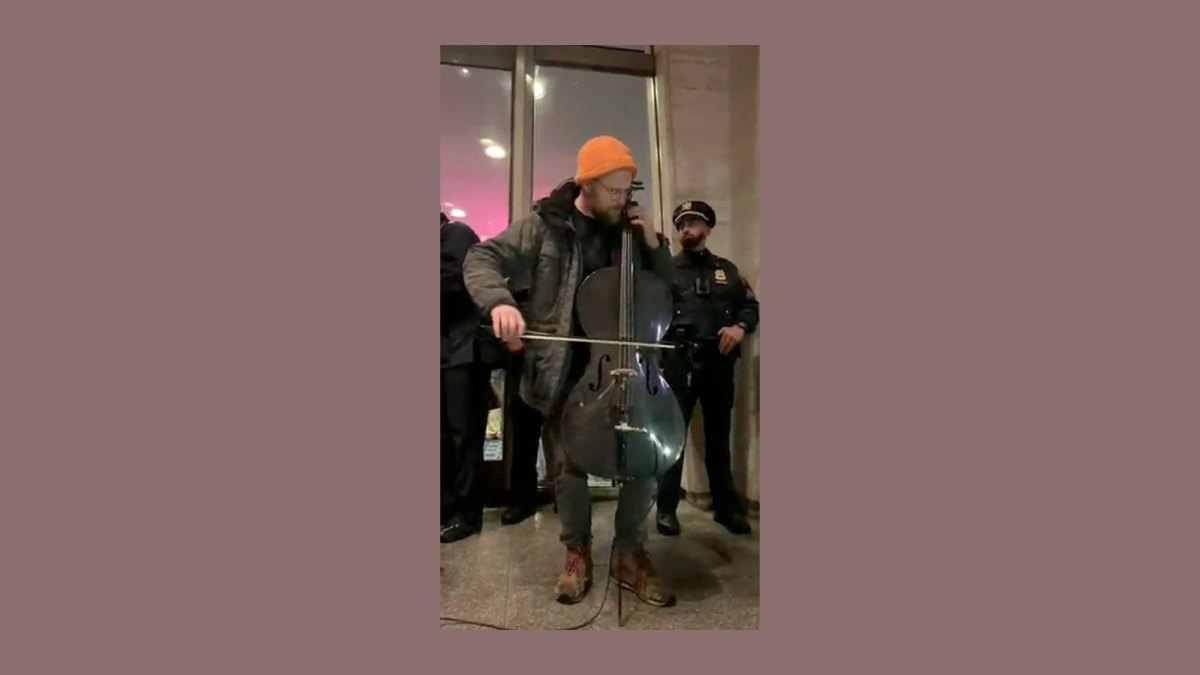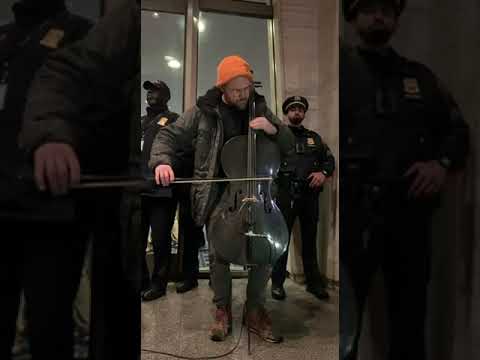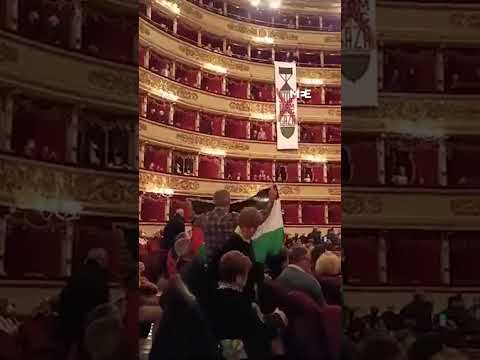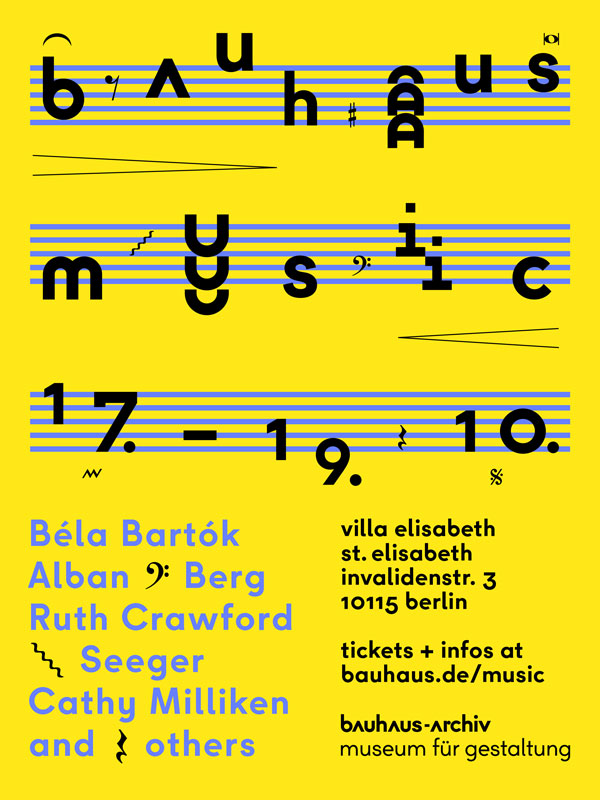On Saturday, January 6, a group of activists taking part in the global Shut It Down for Palestine movement marched through a wintery mix of sleet and rain from midtown Manhattan’s Bryant Park to Lincoln Center, blocking the main entrance to David Geffen Hall just as concertgoers began to arrive for that evening’s performance by the New York Philharmonic. The largest banners called for a halt of American funding (both foreign aid and private donations) to the Israeli military. As audiences piled in through the hall’s side entrance, many made their way over to the front doors—from the other side—to watch the demonstration.
This hasn’t been the first time that pro-Palestinian movements have taken over Lincoln Center in recent months. On the eve of the 35th annual World AIDS Day, members of AIDS Coalition to Unleash Power (ACT UP) and Jewish Voice for Peace joined forces for a joint protest on the plaza’s steps calling for the U.S. to “Fund healthcare, not warfare.” Shortly before Christmas, a group of autonomous protesters, joined by the Rude Mechanical Orchestra, led a demonstration that (among other things) called out many of the namesake donors of Lincoln Center’s institutions—including David Geffen—for also having financial ties to the current war in Gaza.
Video footage from that second demonstration shows Lincoln Center security guards and NYPD officers using violence and force against the demonstrators. It made a striking contrast against one of the videos from last weekend’s protest, which featured activist, cellist, and writer Ethan Philbrick playing “Mawtini” (a song regarded as the unofficial anthem of Palestine as well as the larger Arab diaspora). As Philbrick played the elegiac tune about a homeland under siege, a handful of security guards and police watched on without interfering. I asked Philbrick about this moment two days later, in a conversation that also spanned the increasing frequency of performance-disruptive protests, and the challenges that many classical musicians face in taking direct action. As we spoke, another pro-Palestinian protest in New York was simultaneously blocking access to the Holland Tunnel along with the Brooklyn, Manhattan, and Williamsburg Bridges.
VAN: You’ve been at several demonstrations since October. How did you wind up performing at this one?
Ethan Philbrick: I came of age right around 2001 in the States and came into political consciousness during the U.S.’s invasion and occupation of Iraq. I was really viscerally struck by the violent injustice of that war and had a sense of its imperial nature, but without quite the capacity to name it. And at that point, I was at New England Conservatory. That convergence of coming into political consciousness while also training as a classical cellist just became unlivable. It felt impossible to be at conservatory, bringing a Brahms Cello Sonata to a lesson while also trying to think about direct action to stop an unjust, imperialist war. So I left. There were other factors, but this was a big part of it.… I love the cello, and so much of the music I can play on it, but I exist on the very edges of the classical music world. I don’t really exist inside those institutions, I work as a musician more in experimental and interdisciplinary music, and that’s partly political. I don’t have any interest in trying to bend my will towards institutions like Lincoln Center. That doesn’t make sense politically or aesthetically for me.
A good friend of mine organizes with the Palestinian Youth Movement. I’m also a curator at the Poetry Project… and every year, their big event is the [New Year’s Day] marathon. And this organizer friend and I were both at the marathon, and he was talking about this potential action to go to Lincoln Center and was like, “What if we do a counter-performance?” And my first impulse was, “OK, great. I’m going to organize a big ensemble.” I started asking around, and there were some logistical constraints: It was going to be cold and rainy and maybe snowing, and wooden instruments outside… all those things. I’m lucky to have a carbon fiber cello, so I was less worried about that, but it’s also hard to mobilize people in the classical music world. They’re [in a situation that’s] really precarious, even if they’re aligned with drawing attention to the oppression of Palestinian people. They’re in really precarious relation to institutions with incredibly conservative values.
So I ended up just being like, “Well, at the very least, I’ll be down to play.” It was the organizers from Palestinian Youth Movement who had the idea for me to play “Mawtini.” For me, this way of showing up as a musician feels like the very baseline. The least we can do is be available and willing to show up to make a symbolic action and be able to offer our skills and capacities as creators of music; to show up when movements call.
You mentioned having a break with “traditional” classical music in 2001, which is a feeling I’ve had a few times in my life as well, and one I’ve been struggling with again over the last few months. That feeling of “How is anyone just listening to music right now?”
There are all these different modes in which culture and music in particular are used to reproduce a system of violence. Part of it is explicitly as ideological armature of a violent system. But then a lot of it is through creating systems of distraction or spaces of shared negligence. As [my organizer friend was] talking through this action at Lincoln Center, I was like, “Let’s look at what they’re playing that night,” and it was an all-German program: Brahms and Beethoven, and starting with [the Prelude to] Wagner’s “Meistersinger.” The way that in this moment, any kind of articulation of solidarity with the Palestinian people gets misrecognized and misrepresented as somehow antisemitic while this organization is already doing these gymnastics around how to recuperate Wagner for performance… There were two orchestras in action: This orchestra of mobilization and of committed articulation of a system of violence and a call for its end, and then there’s this other orchestra that’s going to play the canon… And all these people were going to go in to hear this other mass coordination of sound, but with a completely different political valence.
And the material circumstances of the experience have shifted.
Hopefully, at the very least. For me, I just don’t mess with the fantasy of a scene of listening in which music is absolute. It’s nothing but its material circumstances and the scene of listening—even if we’re saying it’s a scene of listening to absolute music. That’s just a logic of disavowal. Listening is always its material, institutional context and there is no scene of listening that is not already a political scene.
[With this action], there was a desire to have multiple prongs, where there was the crowd outside, but then they were hoping to also buy a block of tickets to the show and have a disruption from the inside.… They were really ready to do that, and it was literally just the practical concern: The tickets were $200-plus. So just the material circumstance of what it means to be listening in that space is already an economic situation that is so blatantly political.
Anecdotally, it feels like those in-house demonstrations are happening more often: There was the Extinction Rebellion action at the Met. La Scala’s Christmas concert was taken over by a ceasefire protest. I don’t know if it’s just because social media makes these things more viral, or if we actually are seeing an increase in performance-disruptive protests.
One of the helpful things about social media is the universality of tactics. This is something we can do with not that many people, and you can sort of throw a wrench into “business as usual.”… I think it is a tactic with a long history. I remember when I was a teenage classical musician taking some of my first music history surveys, getting more of a historical sense for the material conditions of musical production, and learning about different scenes of performance. Hearing about the riots at the theater during “The Rite of Spring” and being like, “How could that ever happen?!” Because the scene of listening that I know of classical music [today] is such a scene of submission and of quietness and of nobody doing anything. That wasn’t necessarily about political context, but that a scene of listening could be more controversial and actually a space of disruption.… So I think there’s maybe something like an exciting return to the concert venue, not as a scene of submission and silence, but actually as a space of contestation. We come here to actually reckon with what’s happening and reckon with the disagreements that exist within the collective body of the audience.
It also happens that concertgoers at these venues that are seats of power and wealth—the Metropolitan Opera, David Geffen Hall, La Scala—feel so intensely persecuted by the littlest disruption.… Just [someone] saying something at a time when they’re not supposed to say something; it’s as if an entire world has been shaken. Something that pierces that is, I think, really helpful, because that’s part of what keeps these structures in place. The people who are actually in these intense positions of power feel so threatened by the smallest disruption of that power.
Were you seeing that reaction from people on the inside of David Geffen Hall? How busy was it when you started to play?
We arrived around 7:15, so there were the early-comers. I started playing probably just around 7:35, 7:40, so it was when people were really gathered in. The main doors got blocked, but there was still one side entry, which became congested. So the people were in there, and there was this sort of, “Oh my God! Oh no, how could this happen?! I feel unsafe!” When there was nothing threatening going on. It was just people making their voices heard near to where something was happening.
One thing I noticed from the video of your performance was that there were a number of security guards, and maybe even one or two cops, but no one seemed to be doing anything to shut it down. Was that the overall experience of the demonstration?
Yeah, I think they were surprised. I think they were just focused on making sure the action didn’t go inside. So other than blocking the entrance, they just stood around and didn’t necessarily put pressure on it.
Did you have any interaction with audience members that night? It looked like there were some theater staff people coming over as well.
I had a lot of interactions with protesters whom I didn’t know, who were deeply moved by the performance of “Mawtini,” and really, really excited to hear that music. I think it was a testament to how profoundly and unjustly unsupported Palestinian cultural production is… This unofficial anthem that is so widely known among Arabs and especially Palestinians, how infrequent it is for anybody else to play it for something. This literal siege has also been a cultural siege, and one of the effects of it is that these pieces of music are not circulating beyond the communities that are keeping it alive.
The latest from VAN, delivered straight to your inbox
How long did it take you to learn?
Well, I was talking with my organizer friend probably on Thursday [and then I played it on Saturday]..… I found some notation online and just listened to a bunch of different recordings, learning it by ear. And that’s part of what I was finding as I was starting to reach out to classical musicians I know who are in solidarity with Palestine. There was this sort of, “But where is it? How much am I playing?” And I totally get those concerns. But also, if we want to be able to show up for direct action, we need to work more informally, be ready to do weird things, try a plastic instrument so that it’s okay [to play outside in inclement weather]. Things like that. And I think, given more time, we could have [done that]. There are plenty of people who would’ve figured it out. But it’s like, Oh, yeah, if we want to be actually politically-engaged musicians, we have to work with that aesthetically too and be ready to play outside, be ready to learn things by ear, be ready to try things quickly…
Are you saying that just posting that Leonard Bernstein quote to Instagram isn’t enough for musicians?
[Laughs.] Oh God… Yeah, no. This is why I really had to split with that world. I loved playing the music. I loved it so much. It was my entire life. But I just couldn’t stay inside of it… I have hope that there are more cracks now, and more people who have stayed in trying to make it different.
You published a book last year, Group Works, on art collectives and collective action. Do you see any parallels between the groups you studied and what we’re seeing now with these actions?
I wrote this book about artists in New York in the ’60s and ’70s who were really invested in working collectively and thinking about both the promise and the limits of that, and some of the impasses that arise when we try to do things with other people and in novel ways. What happens when we try to do things with people outside of majoritarian institutions or the mainstream institutions and ways of working? What happens when we try to form non-hierarchical organizations to do things or create an artist collective, rather than just do things as an individual? So that is really about community organizing spaces and activist collectives. And I see lots of parallels with how people get things done now.
I see a lot of classical musicians turning to collective forms as sort of alternatives. I’m thinking of International Contemporary Ensemble, wild Up, ACME, yMusic… But none of them are making politically radical statements. None of them are actually pushing on the antagonisms of our time. Maybe they’re trying to do some things, to do some antiracist organizing. Maybe they’re trying to do some representational politics around the composers they present… They’re doing some things, but nobody’s making statements about PACBI. Nobody’s calling out funding structures. Nobody’s actually showing up for direct action, organizing. Even in the spaces where it might be possible to say things that would actually disrupt the political forces of these cultural institutions, they’re afraid to make statements that might truly articulate the political antagonisms of our time.
One collective that comes to mind outside of the classical world is Pussy Riot. They’re a smaller group compared to most large ensembles or orchestras… Is it possible that at a certain point it’s just…
…problem-of-scale stuff? Maybe. But I think that would be a sort of false impasse. Something that’s happening within organizations that are taking a principled stance inside of this war and occupation is that, yes, maybe you lose the Zionist funding source that you had. But you actually come into alignment with other sources and other modes of support that could be even greater. And that is just a risk you have to run. It’s not actually this scene of loss. It’s a scene of coming into alignment with people. You are actually with the world you’re saying you’re invested in. ¶
Subscribers keep VAN running!
VAN is proud to be an independent classical music magazine thanks to our subscribers. For just over 10 cents a day, you can enjoy unlimited access to over 875 articles in our archives—and get new ones delivered straight to your inbox each week.
Not ready to commit to a full year?
You can test-drive VAN for one month for the price of a coffee.





